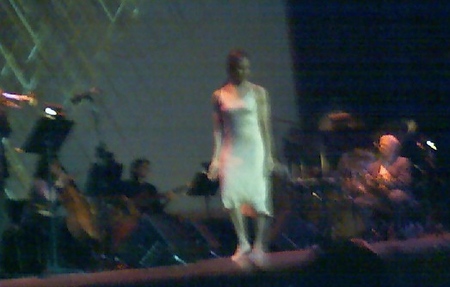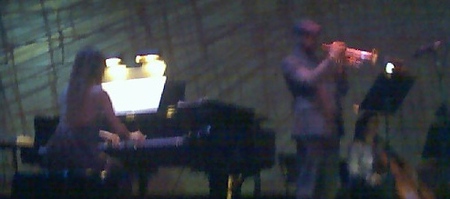Motoko Honda called her multimedia composition "Dreams of a Flower." One observer guessed the flower to be Motoko herself: raised in Japan as a classical pianist, rebelling against the strictures, moving to the USA, struggling toward an identity. And the musical-visual narrative traveled along a similar path.
Solo dancer Roxanne Steinberg was a great choice to play the rootless crocus. Slowly breaking soil into a hostile world, she used her big feet and Amazonian stature to dodge and oppose the storms, her movements as often muscular, deliberately nervous or unbalanced as they were graceful.
The instruments also acted the way humans do: realizing structures and improvisations alone or in twos; occasionally coming together for a groove, a mass improvisation or a concerted statement; relating to one another through shared values and intuition. (The overall philosophy reminded me of Wadada Leo Smith, one of Honda's mentors.)
Behind the drums, Alex Cline used gongs, rattles and skins more to unite than to drive. Steuart Liebig's bass served as a defined male counter-voice and a vehicle for sparky electronic effects. Maggie Parkins' cello and Jeff Gauthier's violin intertwined in tight melodic dialogue. Daniel Rosenboom's trumpet made some of the broader statements with a declaratory challenge or a somber one-note series. Now and then, electro-clouds of varying textures would rise up and move across the stage without announcing their source, the kind of subtle coloration on which Honda always draws.
From her piano bench, a quietly intense Honda directed section changes in the sheet music or transitions of the dance with an outstretched right hand. Her own parts carried the themes of sadness, confusion and triumph with references to California jazz, urban blues, Elizabethan fugue, Moscovian stubbornness and finally an accelerated processional of Japanese pride. If that sounds schizoid, the even insistence and consistent melodiousness of her playing made it hang together.
With Steinberg's constant action and a beautiful backdrop of vibrating lines created live by projection artist Jesse Gilbert and cameraman Moses Hacmon, the visuals made nearly the same impact as the music. One special moment featured Steinberg, wrapped in white fabric and wearing a big white Easter hat, undulating in the foreground while her grainy black image shadowed her. She withered to near nothingness. The violent improv quieted. Steinberg's dark eyes gradually changed from shock to wonder. Her long hair came loose. Her arms spread wide again, and the transparent image on the screen looked like an angel in flight. Damn, that was good.
Some flowers don't need to be replanted every year; they just keep growing back.
Singer-songwriter Mia Doi Todd, eight months pregnant in a big blue dress, opened with a set of Brazilian-flavored acoustic tunes in duo with the spare congas and assorted percussion of Brasil '66 refugee Andres Renteria. Plucking and strumming an acoustic guitar with perfect rhythm, Todd set a scene of sunny beaches and mental ease that contrasted with the distant fragility of her presence. Although her new material was attractive, especially the Joni-like "Cosmic Ocean Ship," the main thing was her ice-coffee voice, which leaped from floor to ceiling with uncanny steadiness and no perceptible effort. An unusual talent, bubbling under for more than a decade.

PHOTOS OF MOTOKO HONDA & DANIEL ROSENBOOM AND ROXANNE STEINBERG BY FUZZY BJÖRK.

